I live in Orlando near the world's best theme parks, and think a coffee-themed amusement park in Colombia offers a more immersive experience as a tourist. Here's what the park is like.
Nick Dauk

- Parque del Café is a theme park in western Colombia, in the UNESCO-recognized department of Quindio.
- I visited the park and think it's a cool way to engage with local coffee culture while enjoying fun rides.
I recently went to Parque del Café, an amusement park in western Colombia dedicated to Colombian coffee.
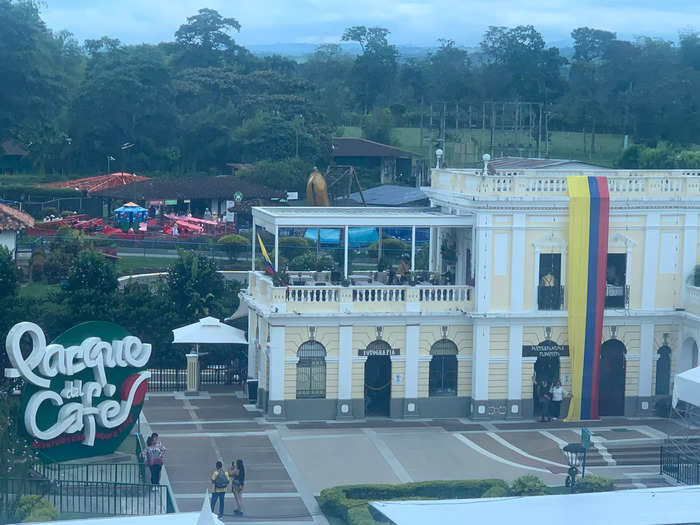
The park is located south of Medellín in the department — or state-like region — of Quindío, part of Colombia's Coffee Triangle. After flying into Quindio's capital city Armenia and spending the night in the nearby town of Salento, my friend and I took a one-hour private car ride to get to the park.
Quindío was one of three departments that formerly produced the majority of Colombia's coffee. Although today these departments only grow about 16% of the country's coffee, areas like Quindío are now well-known for developing tourism showcasing the Colombian coffee culture and history. Quindío is also a World Heritage site as one of the regions in UNESCO's Coffee Cultural Landscape of Colombia.
The park first opened in 1995 as a museum founded by the Departmental Committee of Coffee Growers of Quindío and the National Federation of Coffee Growers of Colombia (FNC), both coffee farmers organizations, with the goal of highlighting how the coffee industry strengthened the country's development. Later, amusement park rides were added to attract younger visitors and more tourists.
Today, the theme park hosts over a million visitors each year who come for its dozens of rides, cultural attractions, events, and food stalls. Set on a working coffee farm that's owned and operated by the FNC, the park offers breathtaking views, a look into the history of Colombian coffee, and, unsurprisingly, plenty of coffee.
We lined up with nearly 400 others at the hilltop entrance before the park opened at 9 a.m. Since we arrived early, I was surprised to see such a large crowd, but a local told us the night before that it's common on Sundays when more people are off work.
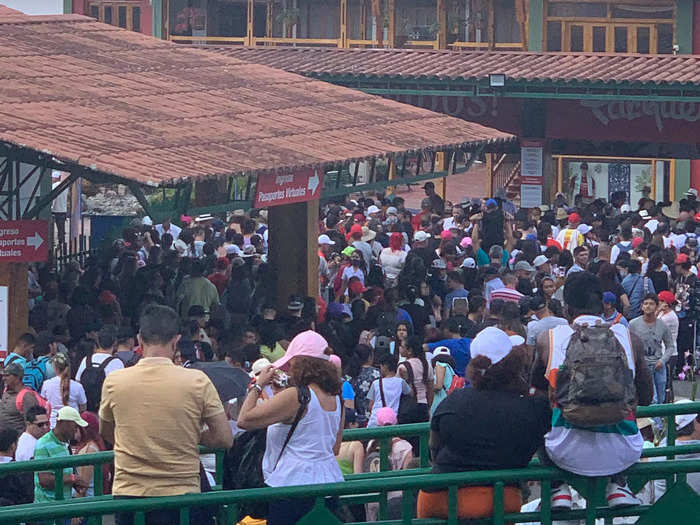
The park entrance is on a hilltop along with a 60-foot observation deck and a museum that showcases the bean-to-brew coffee-making process, the history of coffee production, the contemporary commercialization of the crop, and how cafes prepare specialty coffees in Colombia.
There are multiple ways to reach the main area of the park below, and most visitors lined up for the colorful gondola ride.
I decided to hike down the winding Trail of Myths and Legends, a paved trail that snakes through the western edge of the park with a different statue of a folklore character at every bend.
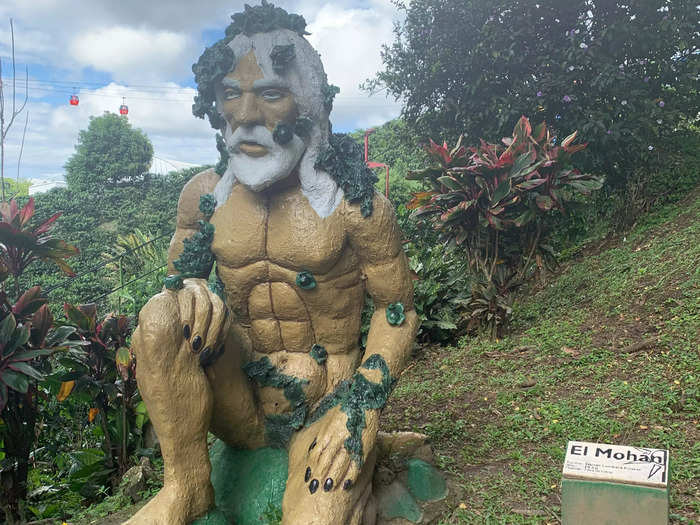
On the trail I saw statues of folklore characters like the jungle-dwelling female figure, La Patasola, and the neanderthal-like spirit, El Mohan.
The half-mile walk took me a little over 15 minutes to complete, which included stopping for photographs, reading each character's plaque, and walking across the suspension bridge to the main area of the park.
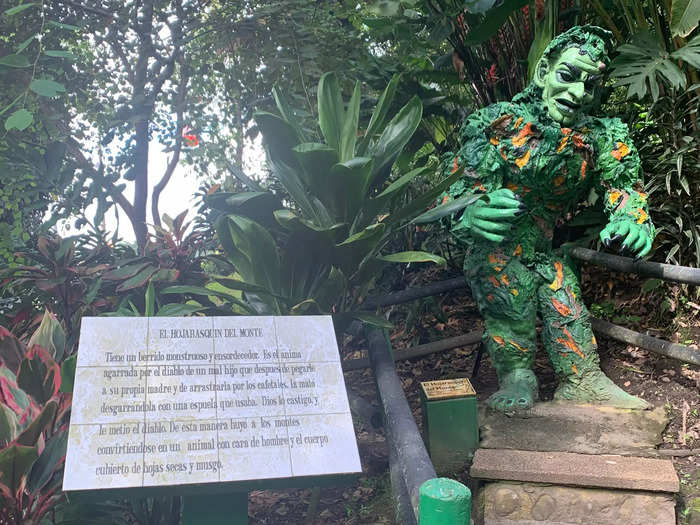
Although the park was crowded, I still felt connected to nature thanks to the landscaping that featured real coffee and bamboo trees.
We even spotted an agouti, a native rainforest rodent that looks like a large guinea pig, roaming around the small coffee trees.
When comparing the rides to theme parks I've visited in the United States, Parque del Café offered all of the hits I expected.
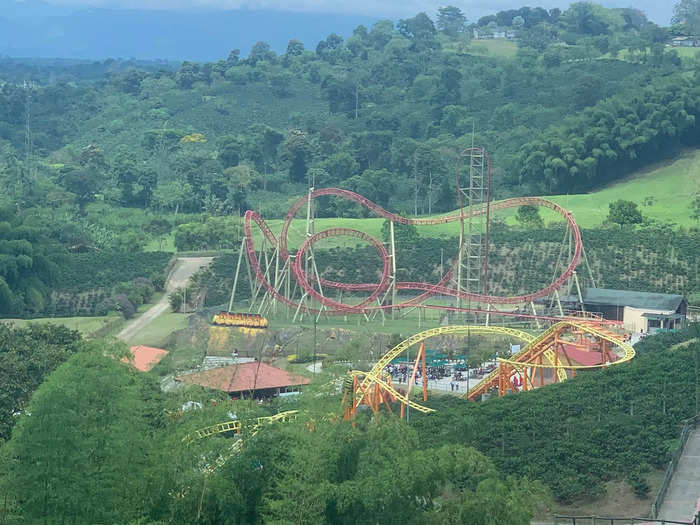
Among the rides were several roller coasters, a drop tower, a water roller coaster, a lazy river ride, bumper cars, two carousels, and a Ferris wheel.
One of the more thrilling rides, Krater, is a red inverted coaster that spun screaming passengers upside down throughout the entire ride.
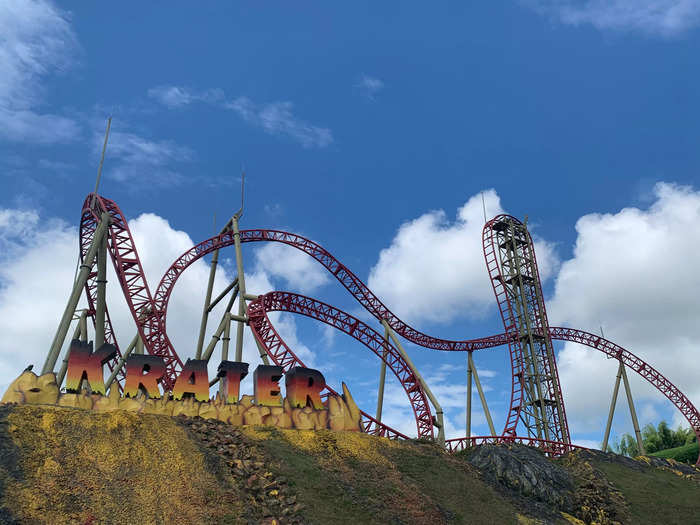
In the park I also saw two dedicated kid-friendly zones, and other family-friendly attractions like guided horse-riding and a colorful train that chugged along the outskirts of the park from the west to east ends.
Locals introduced me to Colombia's national liquor, aguardiente, the previous night in Salento, so I traded Krater's 90-degree drops and 360-degree turns for the more stomach-sensitive Yippe ride.
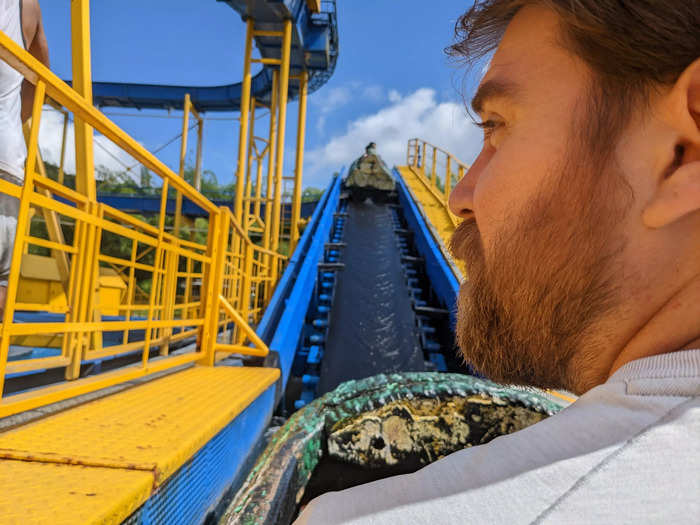
The Yippe ride consisted of Jeep-themed cars pulled along on a curvy yellow track. I thought it was an exciting and surprisingly smooth ride.
Next we rode Water Mountain, a two-drop aquatic coaster, and the Rapid River Ride, which left my friend and I soaked. Water Mountain's two drops weren't frighteningly steep, but the rapid propelling down the slopes was still thrilling enough to warrant gleeful screams from riders. Rapid River Ride was even less intense — I barely held onto the safety bar as the boat took each drop.
A local at our hostel told us that the lines were "crazy" at Parque del Café, but despite the huge crowd at the gate and the dozens of other visitors I saw enter the park, my friend and I never felt rushed to ride everything we wanted.
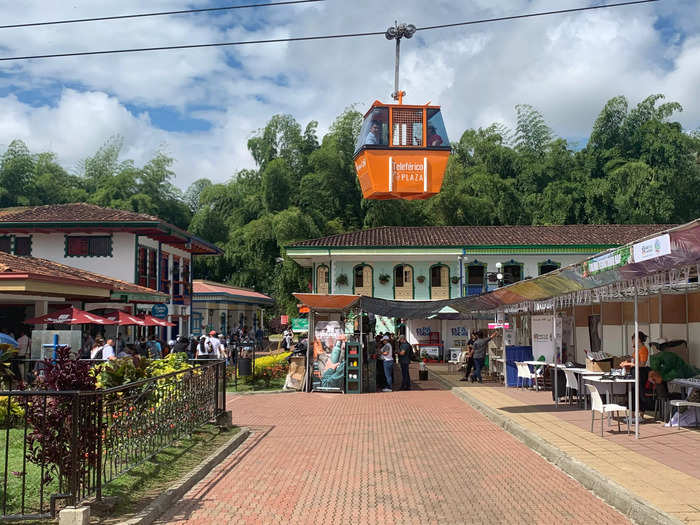
The lines moved relatively quickly — we waited longer to get a photo from our ride on the Yippe roller coaster than we did waiting to get on the ride itself.
The rides at Parque del Café are only the tip of the iceberg — I enjoyed the parks' coffee-focused experiences even more.
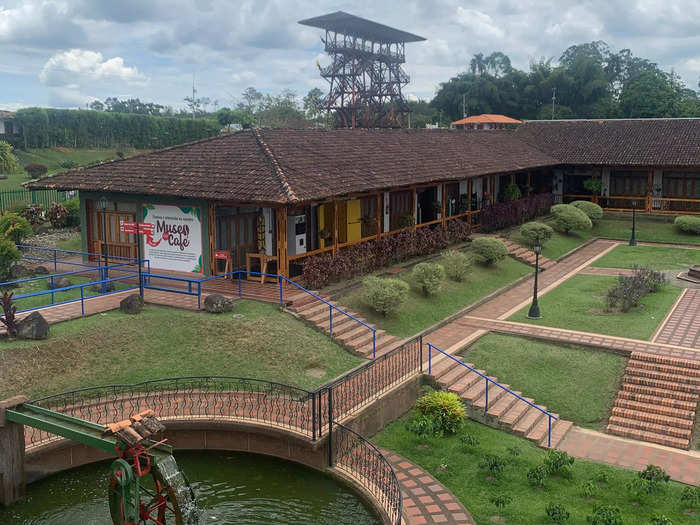
I thought the rides were fun, however, what made this park a real gem in my opinion were the coffee-focused experiences, like the Museum of Coffee building near the entrance.
We mistakenly saved the museum for our final stop thinking it would be an easy walk-through, but it turned out to be a lot bigger than we thought. It's divided into four sections that focus on one element of either the coffee-making process itself or coffee's significance to Colombia.
Museum displays featured coffee-processing tools, bold-print descriptions about the history of coffee, and video presentations on the coffee-making process.
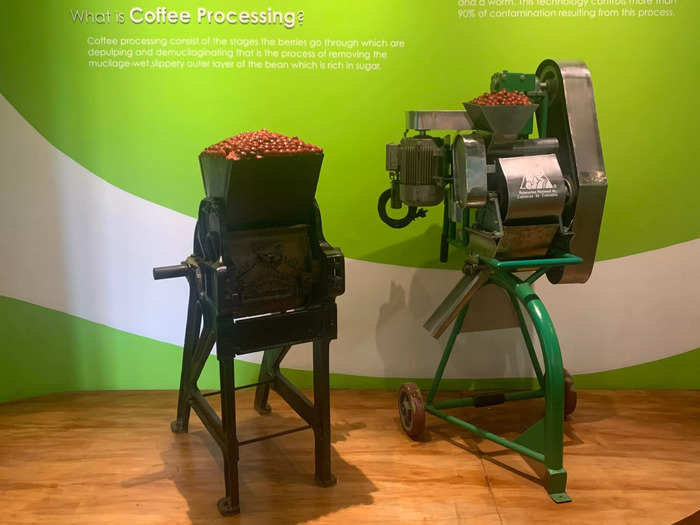
What surprised me the most about the museum were the unique uses of technology like Pepper's ghost illusions and leap motion games. These brought static dioramas on display to life, which I thought was a welcome break from viewing still photography and equipment replicas.
One of the leap motion games I played involved correctly picking ripe coffee beans off of a virtual plant.
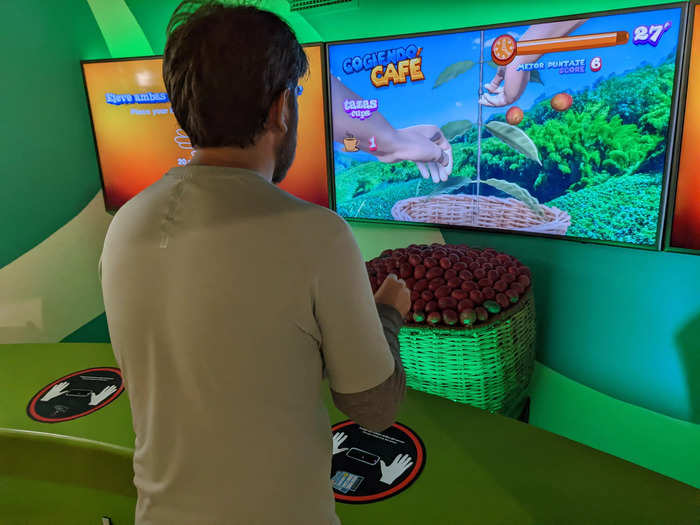
None of the other museums I've visited throughout Latin America offered such a diverse and fun way to engage with the exhibits, I thought.
We happened to visit the park during the Coffee Expo 2022, which only enhanced the cultural immersion. There were live brewing competitions and a few dozen vendors handing out drink samples and selling local products like chocolates infused with coffee and coffee cheeses (which to me seemed like just a hunk of cheese dipped in coffee).
I took home a bag of beans from the stall of Café Jesús Martín, one of my favorite coffee shops in nearby Salento, and a coffee cheese that the vendor claimed is only found in the Coffee Triangle.
I thought the food and drink offerings I tried at the park were relatively standard but still delicious.
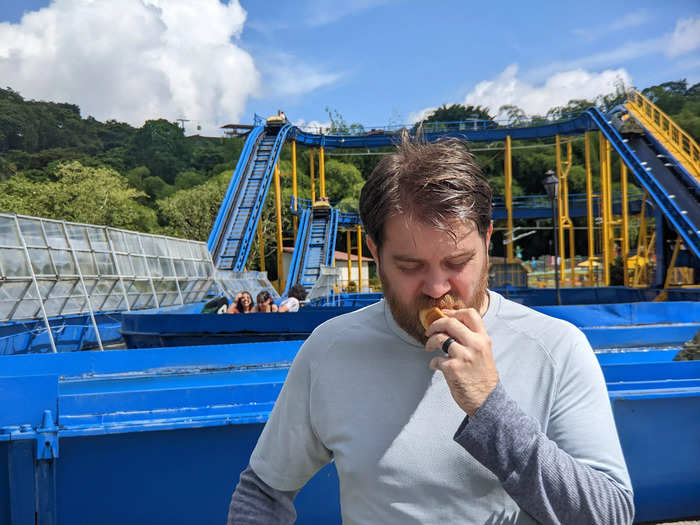
There were more pluses than minuses in the food and beverage category, in my opinion, but I was a little disappointed that I couldn't find any especially unique dishes. Most of the park's permanent food stalls sell comida tipica, like plates of rice, beans, chicken, and empanadas. Other standard fare like chicken tenders, hot dogs, and hamburgers were available, and I also saw a Subway sandwich shop.
I expected higher prices as is typical of theme parks in the US, but I found the food to be quite affordable — I paid only 5,000 COP ($1.14) for a drink and a delicious pandebono filled with cheese and guava.
I tried both the artisanal coffee offerings at the Expo and the standard cups served at the theme park kiosks. Every cup was delightful, although I wouldn't call the brews in the park among the best I've had in the country. The options at the kiosks were very basic: black coffee, cappuccinos, and similar standard drinks. I didn't see any iced coffee or cold brew on offer, or any more unique or inspiring flavors, so I stuck to black coffee.
Overall, Parque del Café completely exceeded my expectations and was a rewarding experience.
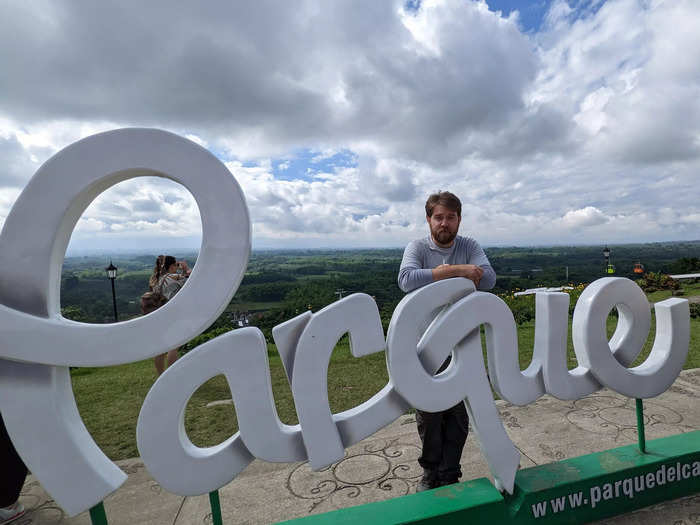
For an open-air theme park surrounded by farmland, I thought it was exceptionally clean and well-kept. I didn't see garbage on the ground or droppings despite the fact that there was a stable full of horses giving rides and wild animals present around the property.
As someone who lives in Orlando, Florida, with some of the world's best theme parks right next door, I think that Parque del Café's cultural immersion delivered a much more fulfilling experience as a tourist. The rides were comparable to those in the US — I found that Parque del Café felt like a mix of Hershey Park and Idlewild & SoakZone Park in Pennsylvania. And Bolivar Square, a center point plaza in the park replicating a traditional Quindiano town, felt more authentic to me than it did cliché.
Kids can have a blast, and adults can leisurely enjoy the entire park without feeling rushed to beat queues or stress about missing out on the "must-dos." While I might not make a point to visit alone or with friends for a second time, I'd definitely consider taking my wife and son for a mini-getaway.
Popular Right Now
Popular Keywords
Advertisement